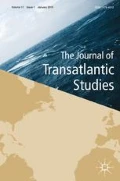Abstract
This article examines the question: why have Americans supported both internationalist and isolationist foreign policies at various points in history? It argues that part of the answer to this question can be found in the structure and nature of American political culture. American political culture frames the terms in which the programmes and plans debated by political leaders ‘make sense’ to the ordinary people whose consent is fundamental to the making of a democratic foreign policy. The article offers an account of the central components of American political culture that are shown to frame four core cultural orientations towards foreign affairs: Liberal Internationalism, America-as-Model, Nativism and Triumphalism. Two dimensions, Liberal Internationalism and America-as-Model, are illustrated through a discussion of contemporary arguments in favour of and opposed to the 1848 Mexican—American War. The article then offers suggestions of how the four categories of American foreign policy orientations can be applied in cases beyond the Mexican—American conflict. Both isolationism and internationalism are shown to be core components of American political culture. They are, as a consequence, eternal features of American foreign policy.
Similar content being viewed by others
Notes
This summary emerges from several sources. Compare Charles O. Lerche, Jr., Foreign Policy of the American People (Englewood Cliffs, NJ: Prentice-Hall, 1958), especially 117–76
Robin Higham, ed., Intervention or Abstention: The Dilemma of American Foreign Policy (Lexington: University Press of Kentucky, 1975), 1–20; and
Walter Johnson, The Battle Against Isolation (Chicago: University of Chicago Press, 1944).
The following discussion rests on a number of works. See, for fuller discussion, John Kenneth White, The Values Divide: American Politics and Culture in Transition (New York: Chatham House, 2003)
John W Kingdon, America the Unusual (New York: Worth, 1999)
Daniel Judah Elazar, American Federalism: A View from the States, 3rd ed. (New York: Harper & Row, 1984)
Daniel Judah Elazar, The American Mosaic: The Impact of Space, Time, and Culture on American Politics (Boulder: Westview, 1994)
Richard Ellis, American Political Cultures (New York: Oxford University Press, 1993)
Louis Hartz, The Liberal Tradition in America (New York: Harcourt, Brace, 1955)
Richard Hofstadter, The American Political Tradition and the Men Who Made It (New York: Vintage, 1974)
Samuel P. Huntington, American Politics: The Promise of Disharmony (Cambridge, MA: Belknap, 1981)
Seymour Martin Lipset, ‘American Exceptionalism Reaffirmed’, in Is America Different? A New Look at American Exceptionalism, ed. B. Shafer (Oxford: Oxford University Press, 1991), 1–45
Frederick Jackson Turner, The Frontier in American History (New York: Holt, Rinehart and Winston, 1962)
Aaron Wildavsky, The Rise of Radical Egalitarianism (Washington, DC: American University Press, 1991). See also
David Boorstin, The Genius of American Politics (Chicago: University of Chicago Press, 1953)
James Davison Hunter, Culture Wars: The Struggle to Define America (New York: Basic Books, 1991)
Seymour Martin Lipset, American Exceptionalism: A Double-Edged Sword (New York: Norton, 1996)
Charles Lockhart, The Roots of American Exceptionalism: Institutions, Culture and Politics (New York: Palgrave MacMillan, 2003)
Deborah L. Madsen, American Exceptionalism (Jackson: University of Mississippi Press, 1998); and
Trevor B. McCrisken, American Exceptionalism and the Legacy of Vietnam: U.S. Foreign Policy since 1974 (New York: Palgrave MacMillan, 2003).
Compare Sidney E. Mead, The Nation with the Soul of a Church (New York: Harper & Row, 1975)
Sacvan Bercovitch, The American Jeremiad (Madison: University of Wisconsin Press, 1978)
Sacvan Bercovitch, The Puritan Origins of the American Self (New Haven, CT: Yale University Press, 1975)
Robert N. Bellah et al., The Good Society (New York: Knopf, 1991)
Robert N. Bellah et al., Habits of the Heart: Individualism and Commitment in American Life (Berkeley and Los Angeles: University of California Press, 1985).
Hartz, Liberal Tradition.
Hanover Historical Texts Project, John Winthrop: A Modell of Christian Charity, (1630). Collections of the Massachusetts Historical Society (Boston, 1838), 3rd series 7:31–48. http://history.hanover.edu/texts/winthmod.html, accessed January 26, 2011.
Marc Howard Ross, ‘Culture and Identity in Comparative Political Analysis’, in Comparative Politics: Rationality, Culture, and Structure, ed. Mark I. Lichbach and Alan S. Zuckerman (New York: Cambridge University Press, 1997), 42–80.
Robert W Johansen, To the Halls of Montezuma: The Mexican War in American Imagination (New York: Oxford, 1985), 286.
‘Speeches of Mr. K. Raynes, of North Carolina’ (Washington, DC: J. and G.S. Gideon, 1845), 5–6.
Johansen, Halls, 284.
Frederick Merk, Manifest Destiny and Mission in American History: A Reinterpretation (Cambridge, MA: Harvard University Press, 1995), ix–x.
Merk, Manifest, ix.
Ibid., 16–17.
Stephen John Hartnett, Democratic Dissent and the Cultural Fictions of Antebellum America (Urbana: University of Illinois Press, 2002), 93.
Merk, Manifest, 25.
Ibid., 29.
Ibid., 46.
Johansen, Halls, 311–12.
Ibid., 311.
Author information
Authors and Affiliations
Corresponding author
Additional information
Lane Crothers is professor of politics and government at Illinois State University. He is the author or co-author of six books, including Globalization and American Popular Culture, Rage on the Right: The American Militia Movement from Ruby Ridge to Homeland Security, and Street-Level Leadership (with Janet Vinzant). His research explores the intersection of culture and practice in political life.
Rights and permissions
About this article
Cite this article
Crothers, L. The cultural roots of isolationism and internationalism in American foreign policy. J Transatl Stud 9, 21–34 (2011). https://doi.org/10.1080/14794012.2011.550774
Published:
Issue Date:
DOI: https://doi.org/10.1080/14794012.2011.550774




